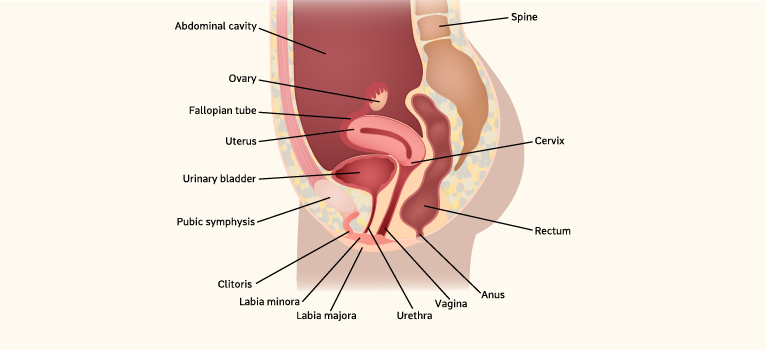Pelvic health physiotherapists are physiotherapists who have specialised training in the management of problems involving the pelvis and everything that is inside the pelvis, including the bladder, the uterus, the bowels, and the pelvic floor muscles and nerves.
This article will explore what a pelvic health physiotherapist is, what they can do to help manage and/or treat some of the symptoms you may be experiencing, what to expect when booking an appointment with a pelvic health physiotherapist, and how to find one near you in Australia.
A pelvic health physiotherapist is often an essential member of your interdisciplinary health care team, and can help you enjoy life to the fullest, while living with endometriosis.

What is a pelvic health physiotherapist?
Pelvic health physiotherapists are physiotherapists who have specialised training in the management of problems involving the pelvis and everything that is inside the pelvis, including the bladder, the uterus, the bowels, and the pelvic floor muscles and nerves. They aim to take a holistic view in their management, considering you as a whole (mind and body).
A pelvic health physiotherapist may be called many things in Australia – a Women’s Health physiotherapist, a Pelvic Floor physiotherapist, a Continence Physiotherapist, as well as a Women’s, Men’s and Pelvic Health physiotherapist. In this article we will refer to them as a ‘pelvic health physiotherapist’.
A pelvic health physiotherapist will have done further training, beyond what they learned in their Bachelor degree at University. This may involve a Postgraduate Certificate, a Master’s degree or intensive courses on specific areas in Women’s, Men’s and Pelvic Health.

What can a pelvic health physiotherapist do to help with my endometriosis?
Pelvic health physiotherapists play a really important role in supporting people with endometriosis. They aim to have a holistic approach, focusing on you as a whole (mind and body), and aiming to help you understand your symptoms and how best to manage and/or treat them.
Endometriosis can be complex. It is often recommended to have an interdisciplinary team of health care professionals, with experience in managing endometriosis, to support you and your symptoms.
A pelvic health physiotherapist may:
- Teach you about the science of pain, and work with you to find strategies to alleviate, or manage, your pain;
- Assist in treating or managing any bladder dysfunction you may have, which may include frequency of voiding (weeing), urinary urgency, urine leakage, and/or bladder pain;
- Assist in treating or managing any bowel dysfunction you may have (which may include bowel pain), help achieve an ideal stool (poo) consistency, help achieve an ideal frequency of defecation (pooing), and/or review how you sit on the toilet to defecate (do a poo);
- Assist in treating or managing any pain with intercourse, which may include education about intimacy, arousal and/or libido;
- Help get you moving in a safe and comfortable way;
- Identify any concerns you may have with your sleep, diet, emotional health (i.e. stress, anxiety, depression), and refer you on to other appropriate health care professionals;
- Assist with relaxation of the body and mind; and/or
- Address any pelvic floor muscle dysfunction.
What happens in an appointment with a pelvic health physiotherapist?
Every appointment will be individualised and unique for you, however it should include:
- Your pelvic health physiotherapist spending time listening to your story, keen to understand your body and mind, and how they link in with your symptoms.
- Your pelvic health physiotherapist asking many intimate questions (as relevant) about your bladder, your bowels, your gynaecological history, your obstetric history and your sexual history. They will also be keen to understand what you do for exercise.
- A pelvic health physiotherapist who is keen to learn what your goals are, and what you hope to achieve from pelvic health physiotherapy.
- Education about what you are experiencing and what you can do to help treat, and/or manage, your symptoms.
- Discussion about different treatment and/or management options, and providing an individualised, unique treatment and/or management plan for you.
- Your pelvic health physiotherapist liaising with other health professionals that are treating you.

Your appointment may also include:
- Being provided with questionnaires or screening tools to further understand your mind and body – such as a depression, anxiety, and stress screening tools.
- Being provided with a bladder diary, a bowel diary, or other types of diaries to further explore, understand, and assist in managing your symptoms.
- A physical examination, which may include assessing your outside muscles – such as your hip flexors, or they may ask to do an examination of the external genital area assessing for nerve and muscle function, and/or an internal vaginal examination to also asses for nerve and muscle function. Sometimes they may even ask to do a rectal examination. If you are not comfortable with any of these assessments, you can always say no.
How long will I have to see a pelvic health physiotherapist for?
Everyone is different. Assessing and managing symptoms of the pelvis can be complex. Some people experiencing pelvic pain only need a few sessions to help them on their journey. However, many find seeing a pelvic health physiotherapists for longer very helpful. It depends on you, and what works for you.

How can I find an appropriate pelvic health physiotherapist near me?
Australia has many wonderful pelvic health physiotherapists in both the public and private healthcare systems.
Some important tips to finding an appropriate pelvic health physiotherapist are to ask if they see people with endometriosis, and if they do internal vaginal examinations. This will help differentiate pelvic health physiotherapists from the ‘Women’s Health Physiotherapists’ who have an interest in this area but don’t regularly treat women with endometriosis.
The Australian Physiotherapy Association will assist in finding an appropriate physiotherapist in the private system. Find a physio
An APA Titled Continence and Women’s Health Physiotherapist is a physiotherapist in Australia who is highly qualified and demonstrates that they have undergone a rigorous process to demonstrate their physiotherapy experience and knowledge.
An APA Specialist Continence and Women’s Health Physiotherapist (as awarded by the Australian College of Physiotherapists) is conferred to physiotherapists who have attained the highest level of expertise. These physiotherapists have undergone a rigorous training and examination process.
What training does a pelvic health physiotherapist have?
In Australia, physiotherapists can complete a Bachelor of Physiotherapy over four years or do a double degree over six years. Often pelvic health physiotherapists will have also completed postgraduate study at university or other forms of postgraduate learning. All physiotherapists are registered with the Physiotherapy Board of Australia and the Australian Health Practitioner Regulation Agency (APHRA).
 Skip to main content
Skip to main content